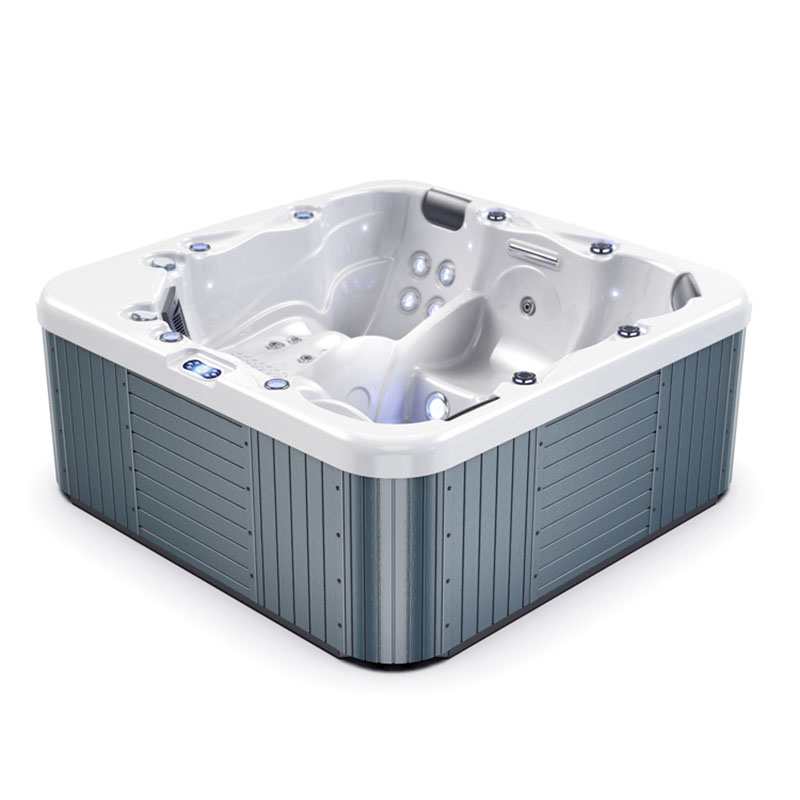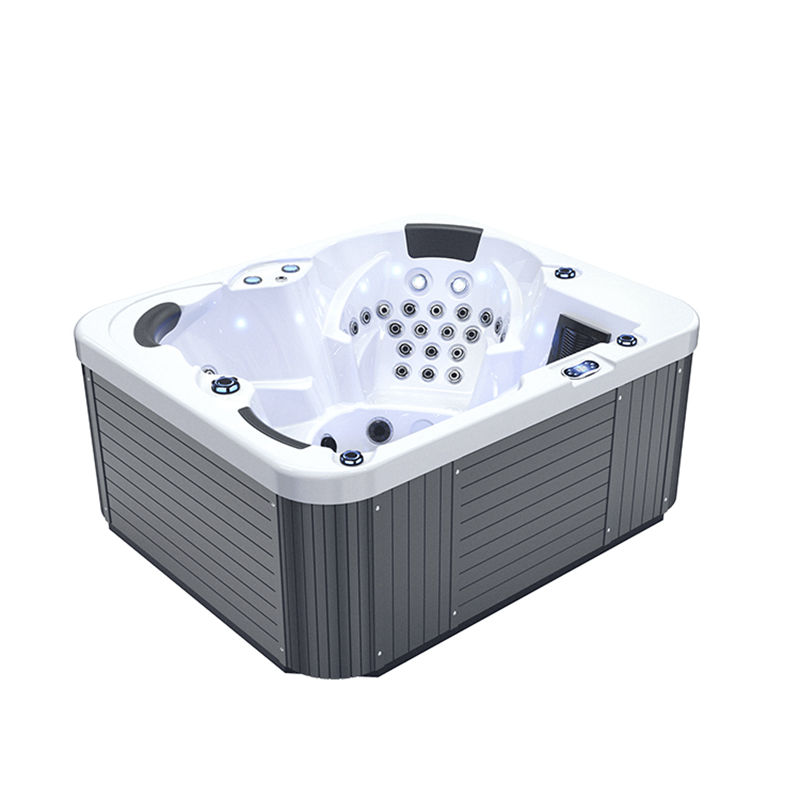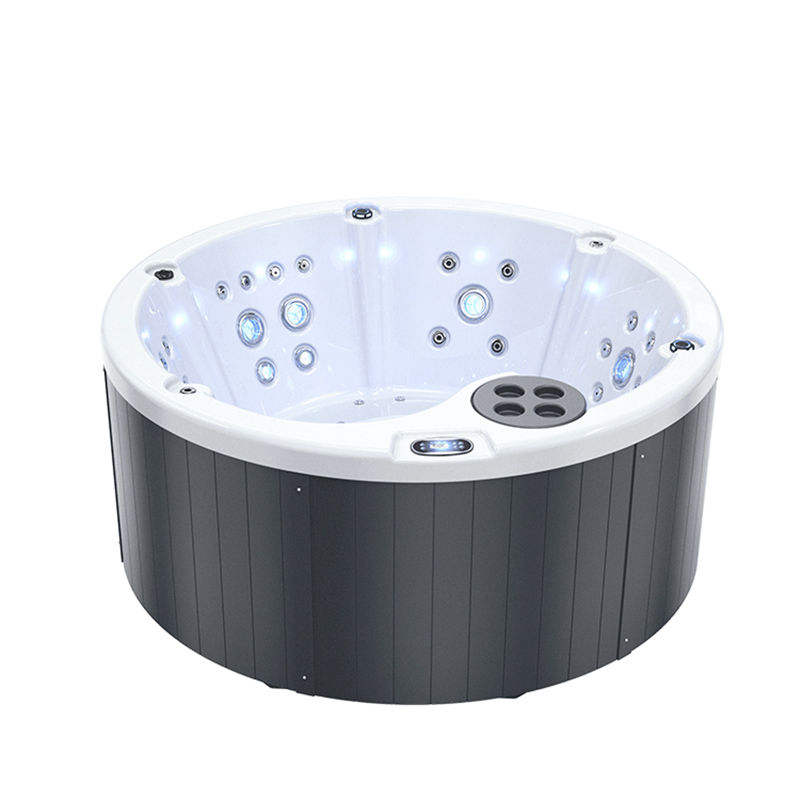Swim spas are fitness equipment that combines swimming exercise and hydrotherapy functions. They are becoming more and more popular because of their versatility and convenience of being able to be used at home. However, although swim spas are an ideal choice for relaxation and exercise for many people, they are not suitable for everyone. Certain health conditions or physical limitations may prevent some people from benefiting from swim spas, or even pose risks.
This article will take a deep look at which groups of people are not suitable for swim spas and explain the reasons behind them, so that readers can fully understand their health needs and potential risks before using them.

People who are not suitable for swim spas:
1. People with cardiovascular disease
2. People with high blood pressure
3. Pregnant women
4. People with respiratory diseases
5. Diabetics
6. People with impaired body temperature regulation
7. People with severe skin diseases
8. People with epilepsy
9. People who are taking certain medications
People with cardiovascular disease
People with cardiovascular disease, especially those with severe heart disease, heart failure or angina, are not suitable for long-term or high-intensity use of swim spas. The reason is that the heating function of the swim spa will increase the water temperature, causing blood circulation to accelerate, which will put additional pressure on the heart.
The hot environment of the swim spa can easily cause blood vessels to dilate and blood pressure to fluctuate. For people with weak heart function, this drastic circulation change may cause angina or other heart discomfort symptoms. High temperatures may also increase the burden on the heart and even cause a heart attack. Therefore, people with serious cardiovascular diseases should consult a doctor before using the swim spa to ensure that the temperature setting of the swim spa is suitable for their physical condition.
People with high blood pressure
People with high blood pressure need to be extra careful when using the swim spa. Although moderate hot water therapy can help relax blood vessels and relieve tension, prolonged exposure to warm water can cause blood pressure fluctuations, especially when the water temperature is too high.
Hot water can cause blood vessels to dilate, causing blood pressure to drop in a short period of time. The resulting rapid blood pressure fluctuations may cause symptoms such as dizziness, fatigue or fainting. If people with high blood pressure stand up suddenly or move quickly, they may increase the risk of falling or other accidents. In addition, the high-intensity water flow system of some swim spa equipment may also put additional strain on the heart and blood pressure. Therefore, it is recommended that people with high blood pressure consult a doctor before using a swim spa and ensure that the water temperature remains within a moderate range.

Pregnant women
During pregnancy, a woman's body undergoes significant physiological changes, especially changes in blood circulation, temperature regulation, and hormone levels. Although gentle hydrotherapy massage may help relieve pregnancy discomfort, such as leg edema or back pain, pregnant women should carefully consider whether to use a swim spa.
First, prolonged immersion in hot water may cause hyperthermia, especially in early pregnancy, and high temperatures may increase the risk of congenital problems such as neural tube defects in the fetus. The increase in the core body temperature of pregnant women may also cause symptoms such as dehydration, dizziness, or a drop in blood pressure. In addition, high-intensity water exercise in a swim spa may not be safe for some pregnant women, especially those who are at risk of miscarriage or have pregnancy complications.
Therefore, pregnant women should consult a doctor before using a swim spa to ensure it is safe. Pregnant women are generally advised to choose a lower water temperature and avoid prolonged immersion in warm water.
People with respiratory problems
People with certain respiratory problems, such as asthma, chronic obstructive pulmonary disease (COPD), or other respiratory problems, should be careful when using a swim spa. Although hot and humid environments can help relieve some respiratory problems, the combination of humidity and heat can make breathing more difficult for people with sensitive respiratory systems.
The steam from hot water can trigger asthma attacks, especially when the humidity around the swim spa is high. Hot, humid air is harder on the lungs and can cause shortness of breath or shortness of breath. In addition, some spas may use chemicals to treat the water, such as chlorine or bromine, and the volatile gases of these chemicals may further irritate the respiratory system and cause symptoms to worsen.
Therefore, people with chronic respiratory problems should avoid spending extended time in high-temperature or high-humidity environments, especially in enclosed indoor swim spas.
People with diabetes
People with diabetes, especially those with unstable blood sugar control or complications of diabetes, also need to be careful when using a swim spa. People with diabetes may face a range of potential health problems in hot environments, including dehydration, hypoglycemia, and perception problems caused by impaired nervous systems.
First, prolonged exposure to a swim spa can lead to dehydration, which can cause blood sugar fluctuations or even hypoglycemia in people with diabetes. Second, diabetic neuropathy is a common complication that reduces a person's ability to sense hot and cold, increasing their risk of getting burned or overheated when using a swim spa.
People with diabetes should ensure that their blood sugar levels are stable before using a swim spa, and limit the duration of their spa session and control the water temperature as recommended by their doctor.

People with thermoregulatory dysfunction
Thermoregulatory dysfunction is a common neurological problem that prevents patients from effectively regulating their core body temperature. Such patients typically include those with central nervous system damage, such as spinal cord injuries, Parkinson's disease, or multiple sclerosis.
Because these patients have an abnormal thermoregulatory mechanism, prolonged exposure to high temperatures can lead to overheating, increasing the risk of heat stroke, dehydration, or heat exhaustion. These patients are often unable to regulate their body temperature through normal sweating mechanisms, and heat can accumulate in the body, leading to serious health problems.
Therefore, individuals with thermoregulatory dysfunction should avoid using high-temperature swim spas, especially those with continuous heating. They can choose low-temperature hydrotherapy and be aware of changes in their body temperature.
People with severe skin diseases
People with certain skin diseases, such as open sores, severe eczema, or other infectious skin diseases, should be extremely cautious when using swim spas. Chemicals in swim spa equipment, such as chlorine or bromine, may aggravate skin symptoms or even cause infection.
Open wounds or sores are susceptible to infection in moist environments, and bacteria in hot water and impurities in swim spa equipment may further increase this risk. In addition, the high temperature and water flow in swim spas may irritate the skin, cause inflammation, or increase itching.
People with severe skin diseases should avoid using public swim spas, especially if their skin conditions have not healed. They should also ensure that the water is clean when using private spas and control the water temperature according to the doctor's advice.
People with epilepsy
People with epilepsy need to be particularly careful when using swim spas. Because swim spas may involve hot water, deep water, and being alone, drowning or other serious accidents may occur if a person has a seizure during a spa session.
Although there are many triggers for epileptic seizures, hot water and environmental changes may sometimes be triggering factors. People with epilepsy may lose consciousness or control of their body when they have a seizure in the water, which greatly increases the risk of drowning. To ensure safety, people with epilepsy should avoid using the swim spa alone, and it is best to have someone to supervise them to deal with possible emergencies.
People who are taking certain medications
Some medications may affect the body's ability to regulate body temperature, blood pressure or other key physiological functions, thereby affecting the safety of individuals using the swim spa. For example, certain antihypertensive drugs, diuretics, sedatives or anesthetics may cause a drop in blood pressure, dehydration or dizziness, which may be more dangerous in a hot environment.
People who take medications should read the instructions of the medication in detail before using the swim spa, and consult a doctor whether it is appropriate to use the hydrotherapy equipment in a hot water environment.
In summary, people with cardiovascular disease, respiratory disease, diabetes, pregnant women, epilepsy, and those taking certain medications need to be especially careful when using a swim spa, or even avoid using one. For these people, the potential health risks may far outweigh the benefits of a swim spa. Before using a swim spa, be sure to consult a doctor and make appropriate adjustments or take precautions based on your personal health conditions to ensure safety.




